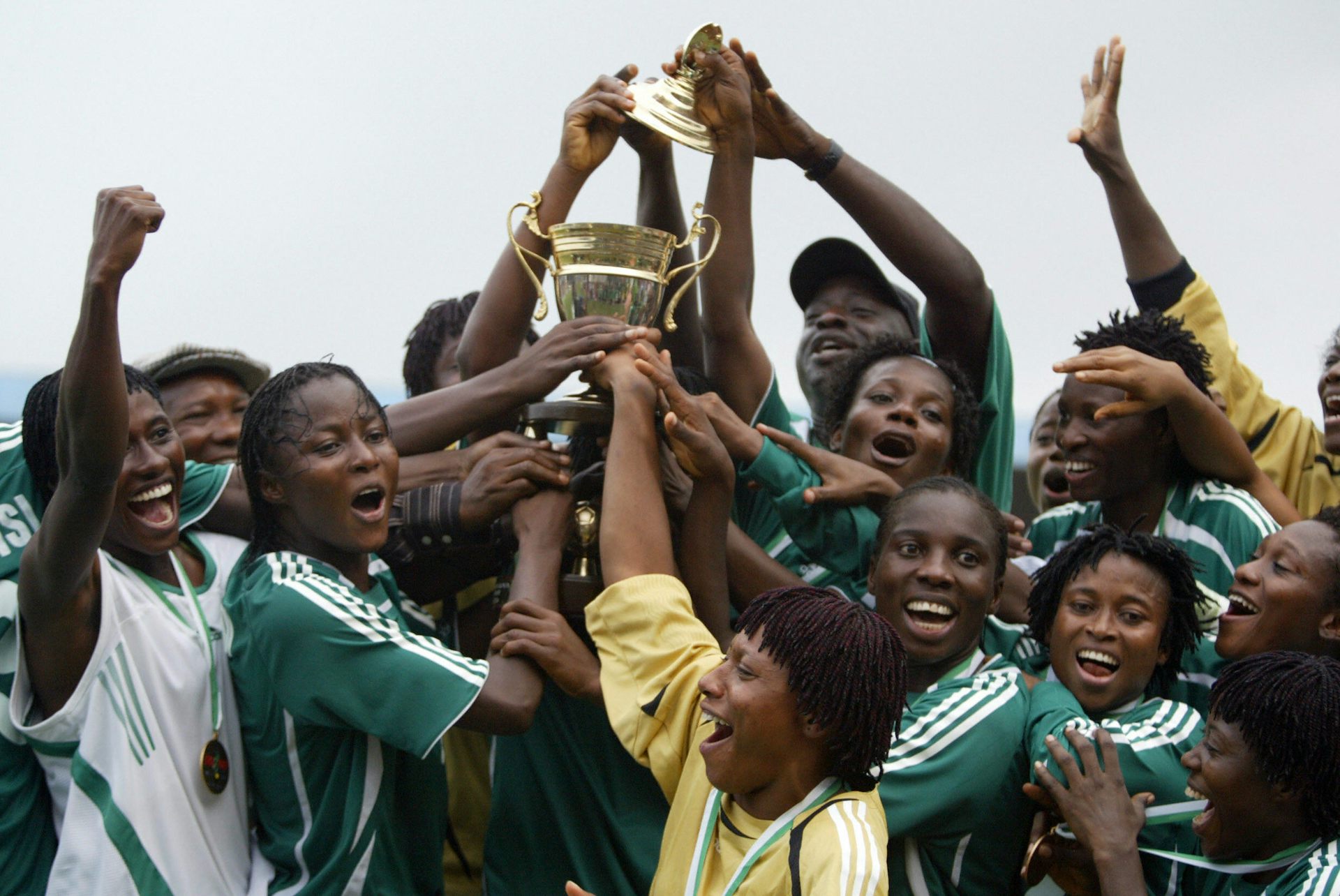
Madge Newcomb @ madgenewcomb37 Member Since: 06 Dec 2024
 United States
United States
About Me
When Started Football In Nigeria: History Of Football Within Nigeria

A tremendous 67% of Nigerians watch Football, which demonstrates how much the sport influences Nigerian culture. Football's journey in Nigeria began over 100 years earlier, shaping the nation's sporting landscape.

Football in Nigeria dates back to the early 1900s. British colonisers brought the sport to the country in 1904. The first taped football match happened that exact same year, kicking off Nigeria's abundant footballing history.

By 1950, Football had actually ended up being Nigeria's nationwide game. Its fast rise led to many clubs and associations forming in the early 1900s. This growth improved Nigerian pride and helped influence political liberty movements.
Nigeria's football legacy now reaches beyond its borders. Over the years, the nation has produced world-class talent, and Nigerian youth groups have won the FIFA U-17 World Cup 5 times.
The Super Eagles, Nigeria's national governing body team, are a force in African Football. They typically get approved for substantial tournaments and make their mark worldwide.
The British Colonial Introduction of Football to Nigeria
Football showed up in Nigeria during the British colonial era. It rapidly recorded the hearts of locals, marking the start of an abundant footballing tradition in the nation.
The First Football Match in 1904
The first football match in nigeria professional football league occurred in June 1904. It was in between Hope Waddell Training Institution and the crew of HMS Thistle. The Nigerian group won 3-2, stimulating an across the country passion for the sport.
Hope Waddell Training Institution vs HMS Thistle
I hope the Waddell Training Institution in Calabar played a key function in early nigerian premier league Football. Their triumph over HMS Thistle's team showed the talent of Nigerian gamers. This match set the stage for Football's development of football in nigeria in the nation.
Early Football Club Formation (1906-1932)
After the 1904 match, Football's popularity skyrocketed. From 1906 onwards, early football clubs started forming, and this grassroots motion spread the sport throughout Nigeria.
The Lagos District Amateur Football Association (LDAFA) was developed in 1932. The LDAFA marked the start of organised Football in Nigeria and led the way for the sport's future success nationally and internationally.
Who Introduced Football in Nigeria
Football showed up in Nigeria in the early 20th century. British colonisers brought this precious sport to the West African country. It rapidly ended up being an enthusiasm that formed Nigeria's sporting landscape for generations.
Function of British Colonisers
British colonisers played an essential role in Nigeria's football history. The very first tape-recorded match happened in June 1904. Hope Waddell Training Institution faced the crew of HMS Thistle.
The Nigerian group won 3-2. This success marked the beginning of a rich football tradition in the country.
Formation of First Football Association
The Lagos District Amateur Football Association (LDAFA) was established in 1932. It laid the groundwork for organised Football in Nigeria, which led the way for the Nigerian Football Association (NFA).
The NFA was founded in 1945. It ended up being the national governing body for Football and oversaw its development across the nation.
Advancement of Local Football Culture
Football rapidly settled in Nigeria, becoming the national sport by 1946. Its availability and simple guidelines helped it spread out quickly. Regional communities welcomed the video game, forming their teams.
This grassroots interest laid the structure for Nigeria's future success. The country's enthusiasm for Football grew, resulting in achievements on the global stage.
"Football ended up being more than just a sport; it developed into an important Nigerian culture and identity aspect."
The British colonisers' introduction of Football triggered a sporting transformation in Nigeria. Football's journey mirrored the nation's development from the very first match in 1904 to the formation of the NFA in 1945.
Today, Football remains an important part of Nigerian life. It's a testimony to the sport's enduring appeal and cultural significance in the nation.
The Rise of Nigerian Football Administration
The Nigerian Football Association (NFA) was developed in 1945. It played an essential role in shaping Nigerian Football. In 1949, the NFA formed Nigeria's first national football group.
In 1959, Nigeria joined the Confederation of African Football (CAF), which allowed it to participate in continental competitions. Nigeria also ended up being a FIFA member in 1960, signing up with the global football neighborhood.
The NFA, later on renamed the Nigeria Football Federation (NFF), organised national competitions. They created the Nigerian Premier League and the Federation Cup, which became the highlights of domestic Football.
Football associations across Nigeria thrived under the NFF's assistance. They nurtured talent and promoted grassroots advancement. Expert Football began in 1990 with sixteen club sides taking part.
"Our objective is to revive football development at the nationwide level and repackage the league in line with global finest practices," states the Nigeria National League.
The Premier League was implemented in 2003. This move intended to improve domestic football requirements and attract more spectators and sponsors to national competitions.
Nnamdi Azikiwe's Impact on Nigerian Football
Nnamdi Azikiwe, born in 1904 in Zungeru, Northern Nigeria, left an enduring mark on Nigerian Football. His impact formed the country's sporting landscape. Azikiwe's passion for sports came from his diverse experiences and education abroad.
Facility of Zik's Athletic Club
In 1938, Azikiwe founded Zik's Athletic Club (ZAC) in Lagos. This club became a symbol of African self-determination. ZAC played an essential function in developing Nigerian Football.
It offered a platform for young athletes to display their skills. The club promoted regional talent and cultivated a sense of national pride.
The West African Pilot's Influence
Azikiwe's paper, the West African Pilot, played a considerable role in popularising Football throughout Nigeria. It extensively covered regional matches, group news, and gamer profiles. This limelights helped grow the sport's fan base.
Football as a Tool for Independence
Azikiwe saw Football's potential as a unifying force in the self-reliance motion. He utilized the sport to break down ethnic barriers, and Football became a symbol of Nigerian unity through his advocacy.
Azikiwe's efforts connected Football to nationalism, contributing significantly to the sport's development and forming its function in contemporary Nigeria.
"Football is not just a video game; it's a powerful national unity and identity tool."
Nigeria's Journey to International Football Recognition
Nigeria's football journey took a significant leap forward in 1960. The country got FIFA subscription, marking its entry into international Football. This turning point coincided with Nigeria's self-reliance from British rule.
FIFA Membership and First International Match
Nigeria's first international match took place on 8 October 1949. They dealt with Sierra Leone and won 2-0 in a historical encounter. This victory stimulated interest for Football across the country.
Early Continental Competitions
Nigeria debuted in the Africa Cup of Nations in 1963. The tournament, hosted by Ghana, saw Nigeria dealing with hard opponents. These experiences showed important for the group's development of football in nigeria.
Nigeria's perseverance paid off in 1973. They clinched gold at the All-Africa Games, marking their first significant continental success. 1976, they secured bronze at the Africa Cup of Nations in Ethiopia.
Nigeria's football prowess grew in the 1970s. In 1978, they repeated their bronze medal task in Ghana. 1980, Nigeria hosted and won its first football association Africa Cup of Nations title.
Development of Nigerian Football Governance
Nigerian football governance has actually seen considerable modifications and difficulties considering that 1945. The Nigeria Football Federation has actually formed the nation's football landscape, and its journey has been complex and transformative.
From NFA to NFF
The Nigeria Football Association started in 1945. It ended up being the Nigeria Football Federation in 2008. This modification aimed to modernise the organisation's structure.
In 2019, a costs was passed to recognise the NFF officially. It's still waiting for governmental approval.
Advancement of League Systems
The NFF supervises three primary leagues: the Nigerian Premier League, Amateur League, and Women's League. These competitors form the foundation of Nigerian Football.
They foster talent and promote the sport nationwide. Nevertheless, challenges like postponed seasons and location disagreements persist.
National Team Formation
Nigeria's Super Eagles national team was formed in 1949. They've received 6 FIFA World Cups and won three Africa Cup of Nations titles.
These accomplishments have actually improved Nigeria's standing in international Football. The Super Eagles' success has actually put Nigeria on the international football map.
However, Nigerian Football faces continuous difficulties. A research study revealed high levels of corruption in football governance. This affects contract awards and gamer choice.
These problems highlight the need for reform. For the sport to grow, transparency in the Nigerian football administration must improve.
Conclusion
Nigerian Football's legacy showcases the nation's resilience and passion. It began in 1904 with Hope Waddell Training Institute facing HMS Thistle. Ever since, Nigeria has become a powerhouse in african cup of nations Football.
The sport's growth shows the country's journey from colonial rule to independence. It has fostered a sense of national identity and unity. Nigeria's global football recognition is undeniable.
The Super Eagles' gold medal at the 1996 Atlanta Olympics is an emphasize. Their remarkable FIFA World Cup performances also stand out. Nigeria has qualified for 6 World Cups.
In 1994, Nigeria attained its greatest FIFA ranking of 5th, strengthening its place on the international phase. Nigerian Football continues to evolve with promising prospects.

Talents like Ahmed Musa and Kelechi Iheanacho shine in leading European leagues. This bodes well for the sport's development. The Nigeria Football Federation guides the video game's development.

Football's withstanding tradition in Nigeria motivates upcoming generations and promises an amazing future for the sport. The beautiful video game stays a source of national governing body pride and unity.
FAQ
Who introduced football to Nigeria?
British colonisers brought Football to Nigeria in the early 1900s. The sport rapidly became popular and woven into Nigerian culture.
When was the first football match played in Nigeria?
The very first recorded football match in Nigeria happened in June 1904. Hope Waddell Training Institution bet the HMS Thistle crew. The Nigerian team won 3-2.
How did Football become Nigeria's national sport?
Football's simple guidelines and availability made it popular in Nigeria. By 1950, it was the national game, inspiring pride and freedom motions.
What role did Nnamdi Azikiwe play in Nigerian Football?
Nnamdi Azikiwe, Nigeria's first President, was essential in developing Football. He began Zik's Athletic Club in Lagos in 1938, and his paper, the West African Pilot, connected Football to the independence movement.
When did Nigeria sign up with FIFA?
Nigeria ended up being a FIFA member in 1960, the very same year it gained self-reliance. This significant Nigeria's main entry into international football governance.

What is the Nigerian Football Federation?
The Nigerian Football Federation (NFF) governs Football in Nigeria. It evolved from the Nigerian Football Association, developed in 1945. The NFF arranges national leagues and competitions, including the Premier League and Federation Cup.
What major successes has Nigerian Football attained?
Nigeria has actually played in 6 FIFA World Cups. The Super Eagles national team has won three African Cup of Nations. They've also won gold in the 2nd All-Africa games.


